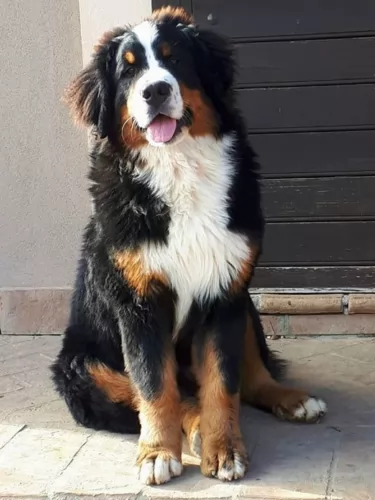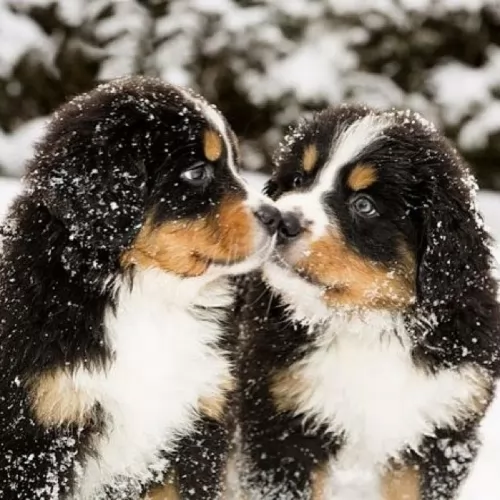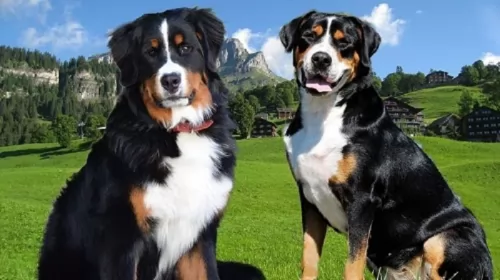 Petzlover
Petzlover Mountain Burmese is originated from Myanmar but Sage Koochee is originated from Afghanistan. Mountain Burmese may grow 18 cm / 7 inches shorter than Sage Koochee. Mountain Burmese may weigh 11 kg / 24 pounds lesser than Sage Koochee. Mountain Burmese may live 6 years less than Sage Koochee. Both Mountain Burmese and Sage Koochee has same litter size. Both Mountain Burmese and Sage Koochee requires Low Maintenance.
Mountain Burmese is originated from Myanmar but Sage Koochee is originated from Afghanistan. Mountain Burmese may grow 18 cm / 7 inches shorter than Sage Koochee. Mountain Burmese may weigh 11 kg / 24 pounds lesser than Sage Koochee. Mountain Burmese may live 6 years less than Sage Koochee. Both Mountain Burmese and Sage Koochee has same litter size. Both Mountain Burmese and Sage Koochee requires Low Maintenance.
 The Burmese Mountain Dog is quite often taken to be the Bernese Mountain Dog, a Swiss farm dog. However, the Burmese Mountain Dog comes not from Switzerland but from Myanmar and Burma. The Burmese was bred to hunt skunks and guard livestock for the northern tribesman of Myanmar. The way they hunted for the aggravating skunks was to hide themselves in the underbrush and wait for the skunk to go by. Their facial markings confuse skunks when they see him in the bush with a black and white face. At the same time, his rust color lets the hunter know he is the dog not the skunk.
The Burmese Mountain Dog is quite often taken to be the Bernese Mountain Dog, a Swiss farm dog. However, the Burmese Mountain Dog comes not from Switzerland but from Myanmar and Burma. The Burmese was bred to hunt skunks and guard livestock for the northern tribesman of Myanmar. The way they hunted for the aggravating skunks was to hide themselves in the underbrush and wait for the skunk to go by. Their facial markings confuse skunks when they see him in the bush with a black and white face. At the same time, his rust color lets the hunter know he is the dog not the skunk.
The Mountain Burmese is an incredible athlete despite the size. They are agile. They are quick. They can climb trees – as many as fifty feet while chasing a skunk. They also make a great companion and love to be a family dog. They are calm and gentle as an adult and great with kids. They are easily trained but remember they can climb trees. However, they do not do well with cats that are black and white or solid black because they confuse them with the skunk prey.
 Known also as the Kuchi Dog, the Sage Koochee is a dog that was bred more for his characteristics than his looks. He was bred to be a protector and guardian and named after the Afghan Kochi people.
Known also as the Kuchi Dog, the Sage Koochee is a dog that was bred more for his characteristics than his looks. He was bred to be a protector and guardian and named after the Afghan Kochi people.
Referred to as the Kuchi or Sage Kuchi, this working dog has always helped nomads with guarding their caravans and livestock. The dog has genetic resemblance with the Central Asian Ovcharka but isn’t recognized as an official breed by any of the major kennel clubs.
 The Mountain Burmese Dog is a large, sturdy, well built and athletic canine. Strong and well balanced, he is agile and athletic when it comes to the work, he has to do in chasing skunks. He has a full body with a large head and dark, oval eyes. The Burmese has triangular ears close to his head and medium in size. With a flat, broad skull the muzzle is straight and strong. They have black noses and a scissors bite, on their muscular, strong neck. With a deep chest and broad back, they have strong ribs. Finally, the tail is bushy, long and hangs low.
The Mountain Burmese Dog is a large, sturdy, well built and athletic canine. Strong and well balanced, he is agile and athletic when it comes to the work, he has to do in chasing skunks. He has a full body with a large head and dark, oval eyes. The Burmese has triangular ears close to his head and medium in size. With a flat, broad skull the muzzle is straight and strong. They have black noses and a scissors bite, on their muscular, strong neck. With a deep chest and broad back, they have strong ribs. Finally, the tail is bushy, long and hangs low.
 The Sage Koochee is a large molosser dog, although they do vary quite a bit in height. This is because they generally come in 3 varieties.
The Sage Koochee is a large molosser dog, although they do vary quite a bit in height. This is because they generally come in 3 varieties.
They can stand at between 58 to 89cm in height and they weigh between 38 to 80kg. This is because this dog is divided into 3 types. The coat of this dog can be short, medium or long, and colors can vary quite a bit as well.
These are moderate, seasonal shedders. Their tails are usually docked to about 1/3 of their length and their ears have been traditionally docked too. They are very territorial and won’t show any tolerance to strangers coming onto the property. He also tends to be aggressive towards other dogs.
These dogs are tough and fierce and also immensely intelligent. Such a dog would have to be trained and socialized or you would land yourself with a strong-willed, disobedient dog.
Once they’ve had training, they are friendly, obedient and affectionate towards their owners, but aren't a good choice for children. They are extremely territorial and make good watchdogs,being prepared to fiercely protect their human family.
The very nature of this dog makes it not suitable for life in the city. It would be terribly frustrated in small spaces and can become aggressive.
 The Kuchi has always been vigilant with guarding livestock, and these tough dogs did the job of guardian and protector extremely well.
The Kuchi has always been vigilant with guarding livestock, and these tough dogs did the job of guardian and protector extremely well.
They’re hardy too, used to coping with extreme weather conditions, from hot deserts to freezing mountain areas. These dogs are powerful and independent and they are also dangerous.
With good training and socialization they can become loving and loyal, but they require a strong, firm owner, and don’t come as recommended if there are children in the home.
 The kind of health issues that most large or giant dogs have to deal with are some of the same things that this breed dealt with.
The kind of health issues that most large or giant dogs have to deal with are some of the same things that this breed dealt with.
 The Kuchi breed is healthy and doesn’t have any particular health issues. Things to look out for are bloat, skin allergies, cancer and parasites.
The Kuchi breed is healthy and doesn’t have any particular health issues. Things to look out for are bloat, skin allergies, cancer and parasites.
Parasites are a common in many dogs. Fleas and ticks are external parasites, but intestinal parasites can be a real nuisance too and endanger your dog’s health.
These parasites live within the dog’s gastrointestinal tract. They can be a host of terrible worms such as roundworm, hookworms and tapeworm among others. The parasites are usually transmitted when the dog ingests contaminated food, soil or even feces.
These parasites can cause endless problems for the dog, from weight loss to diarrhea to vomiting. You will need to get your pet to the vet.
 Feed a high quality dog food designed for large or giant puppies. Feed 3times a day 2.5 times for puppies and go easy on the treats
Feed a high quality dog food designed for large or giant puppies. Feed 3times a day 2.5 times for puppies and go easy on the treats
There is a definite tendency for these dogs to become obese. Don’t overfeed. Don’t free feed. Large breed high quality dog food should be fed 2 times a day and go easy on the treats. Watch his weight.
strength, stamina
The breed is definitely athletic and active. They love to chase and take long walks daily. They need a large yard but be careful as they can climb trees and your fence. They are great companions when backpacking and camping. If there are skunks in the area however watch out! These are hunting dogs despite their size and they would do very well in barn hunt and field trials.
 A nutritious commercially manufactured dog food for large working dogs will be required for this strong, energetic dog. You want to provide it with some variety, so some homemade food added into the dry kibble twice a week will ensure he is healthy and content.
A nutritious commercially manufactured dog food for large working dogs will be required for this strong, energetic dog. You want to provide it with some variety, so some homemade food added into the dry kibble twice a week will ensure he is healthy and content.
Home-made food such as boiled chicken, brown rice or pasta and spinach, sweet potatoes and carrots all boiled slowly together will delight your pet. You just chop it up and add it to the dry kibble twice a week and your pet will never look back.
For his skin and coat, you can try to add in a little bit of raw meat occasionally.Dogs thrive on simple, consistent meals like this – nothing weird and spicy so as to avoid stomach upsets.
Groom your Kuchi dog by brushing him twice a week and check simultaneously for any lumps you may find on him.
Trim his nails.
Check his eyes and make sure they are clear with no signs of discharge.
Check inside the mouth for rotten or bad teeth as he can’t tell you if one is rotten and causing him tremendous pain and discomfort.
Make sure his vaccines are up to date to avoid life threatening canine diseases.
Provide him with a nice, warm dry place to sleep.
Make sure he has access to shade and sun when he’s outdoors.
Have him or her spayed or neutered to avoid puppies